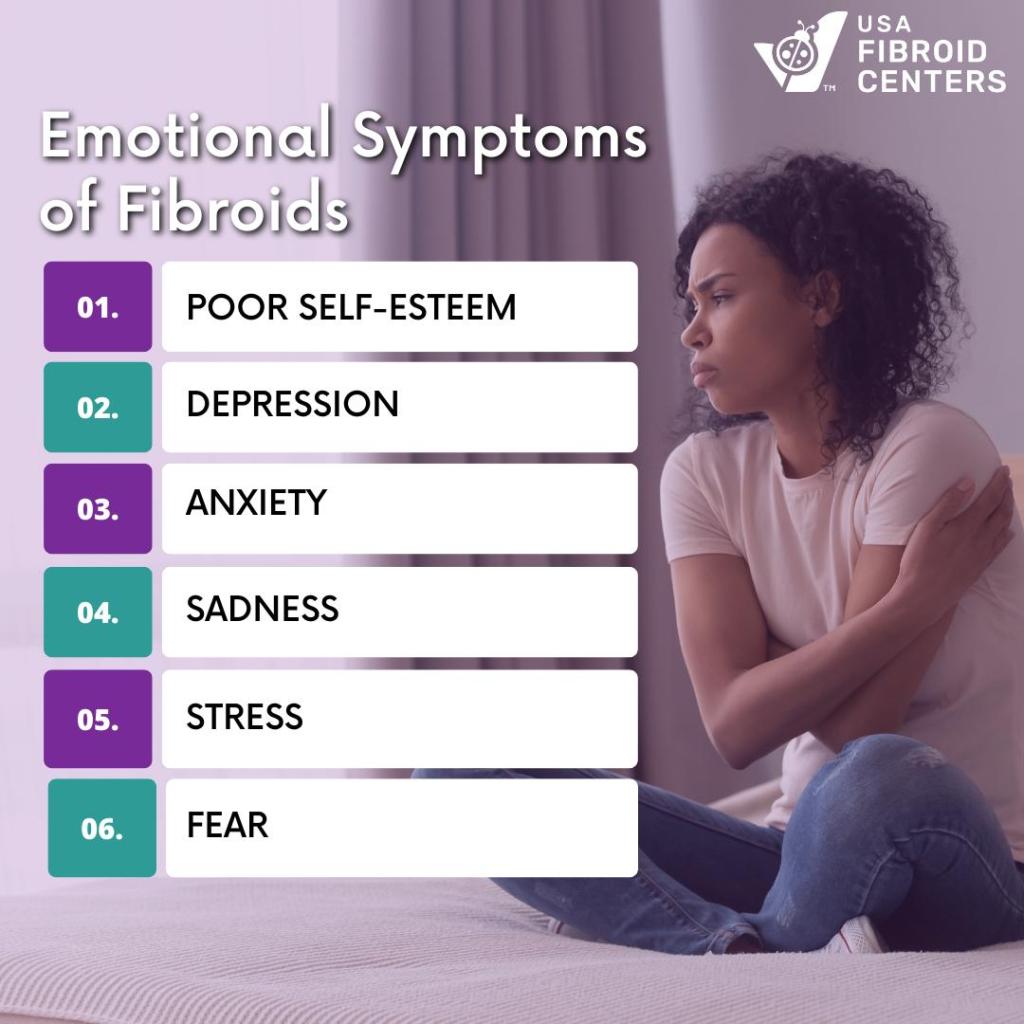
Many women ask us, “Does stress cause fibroids?” While the answer isn’t clear now, some researchers believe there may be a connection. While one study (1) found an association between stress and fibroids, it’s clear that additional research in the area is needed.
While it’s unknown if stress causes fibroids, there is much more available evidence that the opposite can be true. Ask any woman struggling with uterine fibroid symptoms if they are causing her stress, and the answer will most likely be “yes.” Women suffering from fibroid symptoms can have a painful experience that detracts from their quality of life. In these cases especially, women should get help from an experienced fibroid specialist to re-establish normalcy and quality of life.
Common fibroid symptoms include
- Long and heavy periods;
- Bleeding between cycles;
- Anemia;
- Pressure in the pelvic area;
- Protruding belly;
- Frequent urination;
- Pain in the pelvic area, back, and/or legs;
- Pain during intercourse;
- Infertility.
Think you might have fibroids? Use our symptom checker to learn more.
Can Stress Cause Fibroid Symptoms to Flare Up?
Yes, stress can cause fibroids to flare up. When you are stressed, your body releases the hormone cortisol. Cortisol can increase the production of estrogen, which can stimulate the growth of fibroids. Stress can also make existing fibroid symptoms worse, such as heavy menstrual bleeding, pelvic pain, and bloating.
There is a growing body of research that supports the link between stress and fibroids. For example, one study found that women who reported high levels of stress were more likely to have larger fibroids and more severe symptoms. Another study found that women who were undergoing stressful life events were more likely to experience fibroid-related symptoms.
Stress and the Menstrual Cycle
The power of stress can be overwhelming. Stress can also affect biological processes, such as your period. Excessive worrying can put the digestive system into overdrive, causing stress symptoms like diarrhea, frequent urination, or abdominal pain. Experiencing these may indicate your levels of stress are becoming unhealthy.
For some women, chronic stress can even play a role in causing irregular periods. As your stress levels rise, your menstrual period could potentially stop and start at abnormal times. Some researchers have found that stress plays a role in suppressing the functioning of the hypothalamus, which controls the pituitary gland which controls the thyroid, ovaries, and adrenal glands. All of these organs manage hormones that can directly affect your periods.
Toya Johnson, shared her journey with fibroids and the stress they placed on her everyday life.
How Fibroids Affect Daily Life
Do fibroids affect emotions? Besides their physically painful symptoms, fibroids can take an emotional toll. Women experiencing fibroid pain during sex may worry about how it may affect their relationship. Frequent night time urination may disrupt a woman’s sleep, leading to a lack of energy and focus or increased irritability. Women who bleed copiously during their menstrual cycle may develop anemia due to the loss of blood, which can contribute to lethargy and fatigue. Women suffering from fibroids may also struggle with poor self–image. Especially if fibroids are large enough to increase the size of the abdomen, making it appear as if the woman is pregnant.
Some women may feel stressed and anxious that heavy or irregular menstrual blood flow will stain their clothes, especially while they are out in public.
The painful and challenging symptoms of fibroids can also cause stress in the workplace. According to a survey of nearly 1,000 women published in the American Journal of Obstetrics and Gynecology and the Journal of Women’s Health, 28 percent of women said they have had to call in sick from work due to fibroid symptoms. Another 26 percent said their symptoms prevented them from completing their basic workplace responsibilities.
Fibroid Pain
Uterine fibroids can cause pain, severe cramping, and painful menstruation. They may also cause uncomfortable swelling and bloating in the abdomen and can press on the bladder, making it feel like you need to urinate frequently and quickly.
As fibroids grow, they can press on other organs and areas of the body, causing pain in other regions. You may even feel fibroid pain in the pelvic area or lower back, which can radiate down your legs. Fibroids can also cause pain during sexual intercourse. Pain with fibroids can be almost constant, which can affect your emotional health.
Fibroids and Emotional Trauma

Finally, uterine fibroids can trigger fear-related stress in women. The same survey reported that women with fibroids had many worries about their health including:
- Fear that the fibroids would keep growing (79 percent of respondents)
- Fibroids would lead to future health problems (63 percent)
- They would need a hysterectomy (55 percent)
Dealing with the pain and other effects of fibroids can lead to depression. You may feel like you can’t go out during your period for fear of embarrassment. You may struggle to be intimate with your partner, or even feel like you’ve lost your femininity. If the fibroids are causing bloating you may feel unattractive. And if you worry you can’t get pregnant because of fibroids, it can cause you to feel depressed.
Tips to Manage Stress Caused by Fibroids
Finding the best way to cope with fibroids and stress is unique for every woman. If you’re unsure where to begin, try stress relief techniques at least once to see which ones show the best results. Here are some of the most effective techniques for reducing stress and anxiety:
- Plan ahead – Reducing the worry of bleeding through your clothing in public starts by being ready. Check out our period survival guide.
- Relaxation Exercises – Find your “ohm”: Yoga, stretching, meditation, along with breathing exercises are great for loosening muscle tension and bringing stress to normal levels.
- Keep your mind occupied – Distraction techniques, whether reading, watching a movie, listening to music, or taking a walk, can help you temporarily shift the focus of attention away from pain and other unpleasant bodily sensations associated with uterine fibroids.
- Lean on somebody – Talk to a friend or family member, as well as your doctor, if you are have difficulty managing stress levels. Pent–up worry or frustration can cause even more stress, so it can be helpful to vent to someone close. Your doctor can help you find effective pain and stress management techniques until you can get treatment.
- Eating healthy – Try to eat a healthy diet for fibroids. Eating fruits and vegetables and avoiding sugar and heavy carbs can help regulate your blood sugar and emotions.
- Exercise – Even though you may not feel like a strenuous workout, even low-impact exercise, such as walking or stretching, can help you feel better. Exercise releases endorphins, which can improve your mental state.
Most importantly, seek treatment with an experienced fibroid specialist. They can work with you to create a personalized treatment plan to help you get your life back.
Find Hope with Us
If you are suffering from painful and prolonged menstruation, don’t delay your treatment – no woman should live in constant discomfort. USA Fibroid Centers offers a minimally invasive and non-surgical treatment for fibroids called Uterine Fibroid Embolization (UFE). This quick, outpatient treatment reduces the size of the fibroid tumor without affecting the uterus, which can alleviate symptoms of uterine fibroids.
Call 855.615.2555 or click the button below to schedule an initial consultation with our interventional radiologists. We want to help eliminate the source of fibroid-induced stress in your life.



